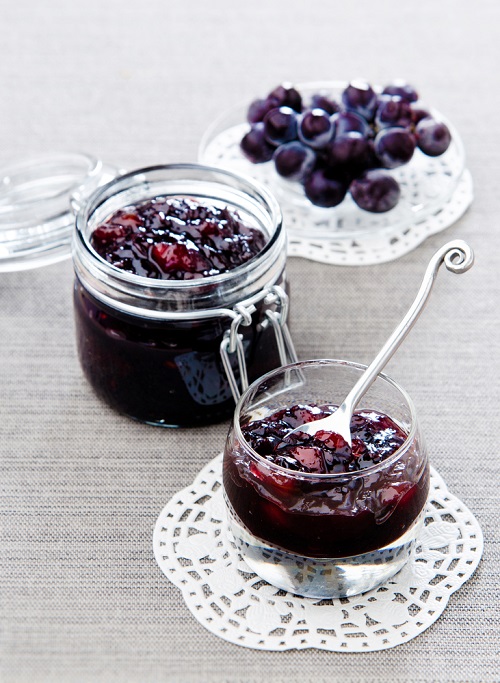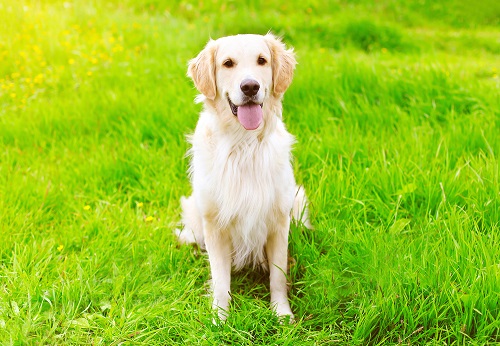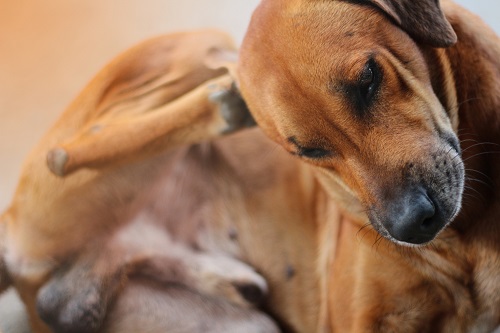Can Dogs Eat Grape Jelly? Is it safe to use as an occasional treat? Let’s have a look at all the details you need to know!
Can Dogs Eat Grape Jelly? If you, too, have this question in mind, then we have the answers for you! Keep on reading!
What is Grape Jelly?

Grape jelly is a type of fruit spread made from grapes. It is typically made by cooking and straining grapes to create a juice, which is then combined with sugar and pectin to create a gel-like substance. Grape jelly can be used as a topping for toast, biscuits, and other baked foods, and it is a popular ingredient in many recipes, including marinades and desserts.
Can Dogs Eat Grapes? Read here
Can Dogs Have Grape Jelly?
No, dogs should not have grape jelly!
Grapes, the primary ingredient in grape jellies, is toxic to dogs and can lead to severe health issues. Although the grape juice used in jelly production is often processed and filtered, there is still a possibility that it retains traces of compounds that can be harmful to dogs. Even small amounts of grapes or raisins can potentially cause adverse effects in canines, such as vomiting, diarrhea, abdominal pain, and in severe cases, kidney damage.
Is Grape Jelly Bad For Dogs—Potential Health Concerns

Yes, grape jelly can be toxic to dogs and can potentially cause kidney failure or even death. The toxic substance in grapes and grape-containing products like grape jelly is not yet fully understood, and some dogs may be more sensitive to it than others.
- Acute Kidney Failure: Even small amounts of grapes can cause kidney failure in some dogs, while others seem to tolerate them without issues. It’s not clear why this variability exists, but because of the potential severity of the issue, it’s best to avoid giving any grape products to dogs.
- Gastrointestinal Upset: Before kidney problems develop, dogs may experience upset stomachs, including vomiting and diarrhea.
- Choking Hazards: If the grape jelly contains grape skins or seeds, it can pose a choking hazard to dogs, especially small breeds.
- Obesity and Diabetes: Grape jelly is high in sugar and calories, which can lead to weight gain and increase the risk of developing diabetes in dogs if fed regularly in large quantities.
- Dehydration: As a result of vomiting and diarrhea, a dog can become quickly dehydrated, which may lead to other health issues.
- Hypovolemia (Low Blood Volume): This condition can develop secondary to dehydration and can lead to shock, which is a life-threatening condition.
- Anuria/Oliguria (Reduced or No Urine Production): This is another indication of kidney failure and can be identified by noticing that your dog is drinking more but producing less urine.
Can Dogs Eat Apricots, Read here!
How Much Grape Jelly Can Kill a Dog?
The amount of grape jelly that is toxic to dogs is not precisely known. However, the toxic dose can vary depending on factors such as the size and weight of the dog, their age and overall health, and the amount of grape jelly consumed.
As a general guideline, even a small amount of grapes or grape jelly can be harmful to dogs, so it’s best to avoid feeding them these types of foods altogether.
What to Do If Dog Eats Grape Jelly?

If your dog has ingested grape jelly, it’s important to take immediate action because of the potential for grape toxicity. Here’s what to do:
- Remove any Remaining Jelly: If there’s any grape jelly left within the dog’s reach, remove it immediately to prevent your dog from consuming more.
- Contact your Vet or a Pet Poison Control Center: This should be done immediately. Given the potential severity of grape toxicity, you must get professional advice as soon as possible. You may need to provide information such as your dog’s weight, the amount of jelly consumed, and any symptoms your dog is displaying.
- Watch for Symptoms: Symptoms of grape toxicity can include vomiting, diarrhea, lethargy, loss of appetite, abdominal pain, and signs of kidney failure like increased thirst and urination or decreased or absent urine production. These symptoms can develop within a few hours to a few days after consumption.
- Monitor Your Dog Closely: Even after your dog has been treated, continue to watch for signs of illness. Sometimes symptoms can take a while to appear, and early detection can make a significant difference in the outcome.
Can Dogs Have Oranges? Read here
Best Alternatives to Grape Jelly for Dogs
- Peanut Butter: This is a favorite treat of many dogs. Choose a natural, unsalted, and xylitol-free version, as xylitol is toxic to dogs. Also, be aware that some dogs may have nut allergies. Learn more about it here.
- Pumpkin Puree: Make sure it’s 100% pumpkin and not pumpkin pie filling, which has spices and sugar that aren’t good for dogs. Pumpkin is a great source of fiber and can help with digestive issues.
- Apple Sauce: Unsweetened apple sauce can be a good treat for dogs. Apples are a safe fruit option for dogs as long as the seeds and core are removed.
Can Dogs Eat Grape Jelly? Quick Takeaways
So, Can Dogs Eat Grape Jelly? Well, the answer is no. Grape jelly can be harmful to dogs and cause grape poisoning, which can lead to kidney damage or failure. To prevent the risk of grape poisoning, it’s best to avoid feeding grape jelly or any other grape-containing products to dogs altogether.
Can Dogs Eat Dried Prunes? Read here
FAQs
1. Is it Ok for Dogs to Eat Jelly?
Some types of jelly can be safe for dogs in moderation as long as they do not contain any harmful ingredients. It’s important to read the label and ensure that the jelly does not contain artificial sweeteners like xylitol, which can be toxic to dogs. Additionally, be cautious of the sugar content in jelly, as too much sugar can be harmful to your dog’s health. It’s always best to consult with your veterinarian before feeding jelly or any new food to your dog.
2. Will One Grape Hurt a Dog?
While the toxicity of grapes can vary from dog to dog, it’s best to err on the side of caution. Even a single grape can potentially be harmful to dogs. Grapes and raisins have been known to cause severe health issues, including kidney failure in dogs.
3. Can My Dog Eat Strawberry Jelly?
In general, strawberries are safe for dogs to consume in moderation, as they are a good source of vitamins and fiber. However, it’s important to check the ingredients in the strawberry jelly. Make sure it does not contain any harmful additives or artificial sweeteners that can be toxic to your pet. Additionally, consider the sugar content in the jelly, as too much sugar is not ideal for dogs.
4. What are the Symptoms of Grape or Raisin Toxicity in Dogs?
The symptoms of grape or raisin toxicity in dogs may include vomiting, diarrhea, abdominal pain, loss of appetite, weakness, dehydration, increased thirst, decreased urine production, and, in severe cases, kidney failure. If you suspect your dog has ingested grapes or raisins and exhibits any of these symptoms, it’s crucial to seek veterinary attention immediately.
5. Are all Types of Grapes and Raisins Toxic to Dogs?
Yes, all types of grapes and raisins, whether they are green, red, seedless, or have seeds, can be toxic to dogs. The toxic compound is not yet identified, so it is better to avoid all forms of grapes and raisins in your dog’s diet.
6. Is it Safe to Feed Other Types of Jelly to My Dog?
While some types of jelly may be safe for dogs, it’s important to be cautious and read the ingredients carefully. Ensure that the jelly does not contain any harmful substances like artificial sweeteners (such as xylitol) or other toxic ingredients. It’s always best to consult with your veterinarian before introducing any new foods into your dog’s diet.
7. Are there Any Other Fruits or Berries that are Dangerous for Dogs?
While many fruits and berries are safe for dogs to enjoy in moderation, some can be harmful. For example, avocados, cherries (especially the pits), citrus fruits (in large amounts), and certain types of berries like holly berries and juniper berries can pose risks to dogs. Always research and consult with your veterinarian to determine which fruits and berries are safe for your specific dog.
